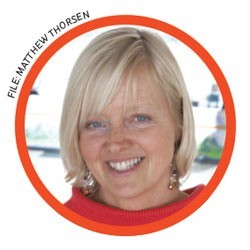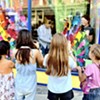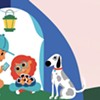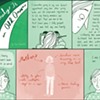Published February 2, 2016 at 10:00 a.m. | Updated April 4, 2022 at 8:02 p.m.
In 2015 alone there were 330 mass shootings in the United States, according to the Washington, D.C.-based nonprofit Gun Violence Archive.
When kids bring up the topic of gun violence, especially school shootings, parents might not know how to respond.
Dr. Mary Ann Donnelly-DeBay, a clinical psychologist who works in Winooski schools, often reminds her students that such incidents are statistically rare. Of far greater concern are the dangers posed by loaded and unsecured guns in the home. This month, Donnelly-DeBay offers tips for talking with kids about guns and gun safety.
KIDS VT: How often does the topic of guns come up in your work?
MARY ANN DONNELLY-DEBAY: Every day. Because of Vermont's hunting culture, firearms are very common in our households. If I'm working with a student with ADHD, depression or one who's not supervised well, I always ask if there's a gun in the home and whether it's locked. I've also learned to ask more probing questions. Sometimes kids will say it's locked but it turns out it's in a closet on a shelf that the kids can't reach. The biggest risk factor for kids right now is not from school violence or mass shootings. It's from an accidental shooting from someone who has a gun that's improperly secured.
KVT: Should parents inquire whether there are guns in their kids' friends' homes?
MADD: Before allowing a play date at someone else's house, it's important to ask parents about guns. This can be very awkward, but there are a few approaches. One might be to include a question about whether there is a firearm in the home when working out the logistics of the play date. Another strategy might be to acknowledge that the question is awkward, but mention that your child is very curious, or impulsive or whatever the case may be, and that you want to prevent any problems.
KVT: What should parents teach their kids to do if they find a gun or are with a friend who finds one?
MADD: First, tell them to get away from the gun. Tell a grown-up. Tell the friend not to touch the gun. Call your mom or dad and/or run home. If you're in the house and hear gunshots, duck and cover and stay away from the windows. Parents should also make sure that their own guns are locked up and secured, and ask family, friends and neighbors to do the same. About one-third of all American children live in homes with guns, and of those households, an estimated 43 percent contain at least one unlocked firearm.
KVT: What should parents tell their kids after a school shooting?
MADD: Encourage kids to talk about their concerns and feelings. Also, it's comforting for them to hear us talk about our feelings. Let them know that these things are not common but attract lots of attention. Recognize that some kids may be reluctant to return to school after such an incident. That's normal. At my school, we've had some alerts activated that, thankfully, didn't turn out to be anything. But they were a great opportunity for teachers, staff and kids to talk about what it was like, how scary it was, what we did right and what we'd do differently next time.
KVT: What about exposing kids to news about gun violence?
MADD: Parents should monitor news programs. Repetitive violence in the news is disturbing to young children. In some cases, violence overload can be directly linked to changes in the brain similar to that seen in abuse. If children watch the news, parents should view it along with them so that they can explain any confusing or inappropriate material. I think it's always important to take our cues from kids. Even if young kids are protected from hearing the news, it's still important to hear the things they have inadvertently discovered and answer their questions, letting them know it's perfectly OK to be scared or worried, while reassuring them of their safety.
KVT: What are your thoughts about allowing toy guns in the home?
MADD: Toys can be confusing. I personally don't like realistic-looking guns. I prefer the Nerf guns and ones that are purple! I know my own kids are outside pretending all sorts of crazy things, and that's good for their socialization and development. But realistic-looking guns are scary given the environment we're in and the way people can, and sometimes do, overreact.
KVT: What's a prudent response to fantasy gun play?
MADD: It's going to happen, whether kids have toy guns or not. I see it at recess every day. But it's really important, especially for little kids, to understand the distinction between reality and play. So, if they're picking up sticks and pretending to shoot each other, they're being socialized through that. Obviously, that's a lot different from having access to a real gun. A lot of kids in Vermont take the state's hunter-safety class, where they learn to distinguish a fake gun from a real gun, and learn proper safety and handling techniques. When kids tell me they're going hunting, I always ask if they've taken the hunter-safety class and talk to their parents about it if they haven't. Parents who are bringing their kids hunting are generally trying to teach a lifelong activity and want to instill the importance of safety. These are the easiest gun conversations I have.
This article was originally published in Seven Days' monthly parenting magazine, Kids VT.
More By This Author
Speaking of KidsVT - Checkup,
-

How Can Parents Ease Kids' COVID-19 Anxieties About Returning to School?
Aug 24, 2021 -

How Can Parents Prevent and Treat Common Summertime Burns?
Jun 29, 2021 -

Should You Adjust Your Parenting Style to Your Child's Personality?
Jun 1, 2021 -

What Should Pregnant & Nursing Women Know About COVID-19?
May 4, 2021 -

Should Parents Be Concerned About Kids' Pandemic Weight Gain?
Apr 6, 2021 - More »
Comments
Comments are closed.
From 2014-2020, Seven Days allowed readers to comment on all stories posted on our website. While we've appreciated the suggestions and insights, right now Seven Days is prioritizing our core mission — producing high-quality, responsible local journalism — over moderating online debates between readers.
To criticize, correct or praise our reporting, please send us a letter to the editor or send us a tip. We’ll check it out and report the results.
Online comments may return when we have better tech tools for managing them. Thanks for reading.












































